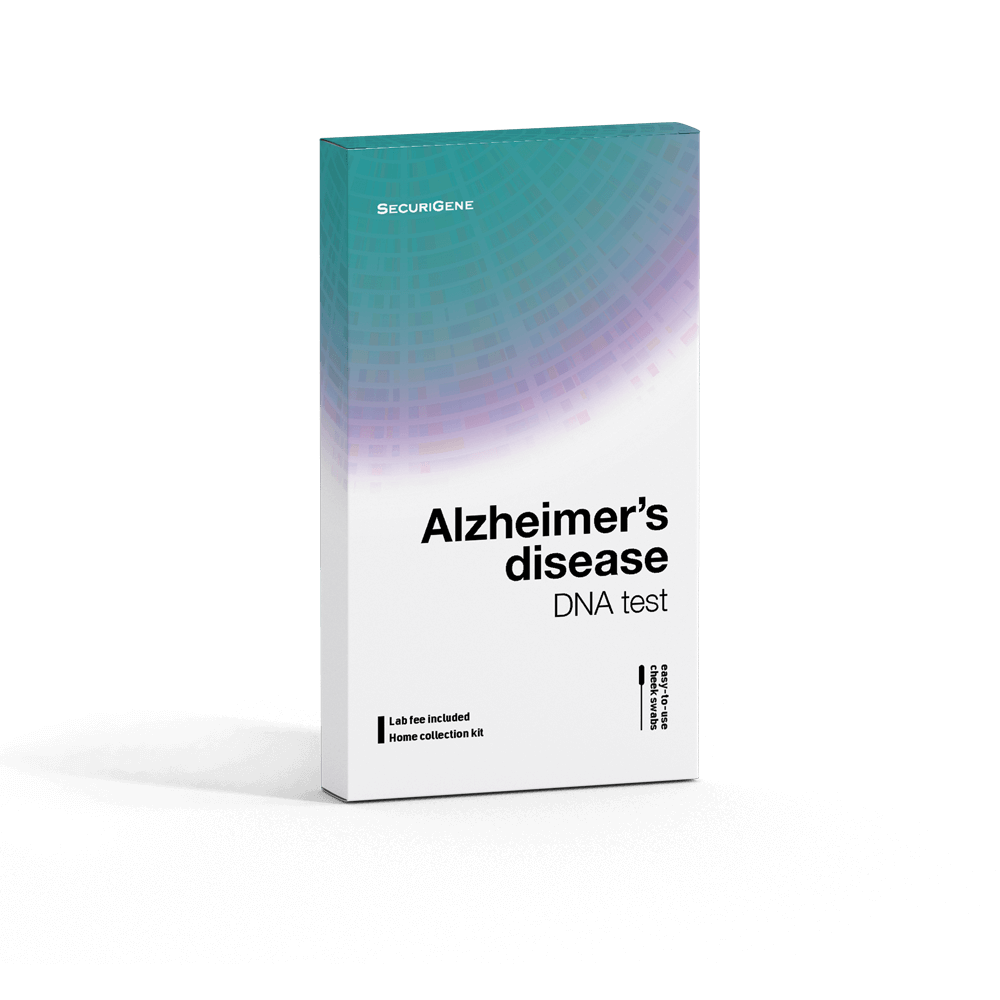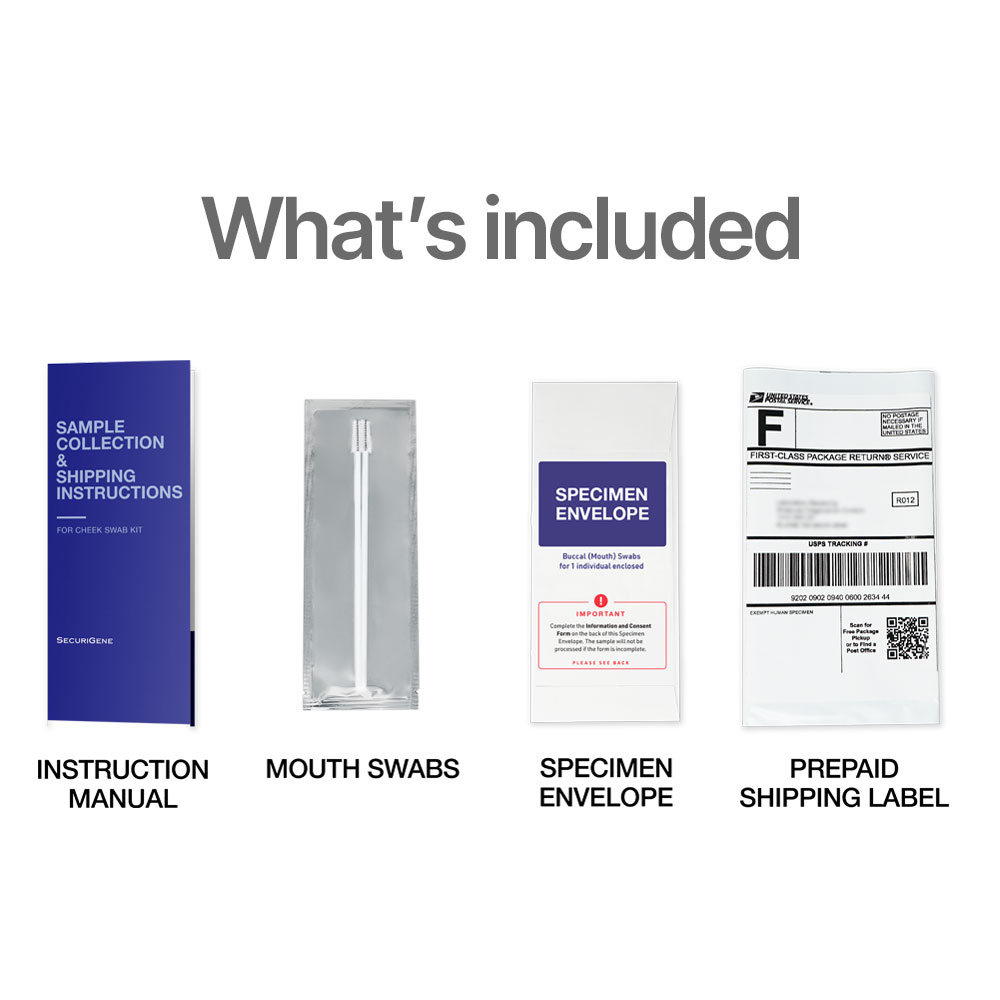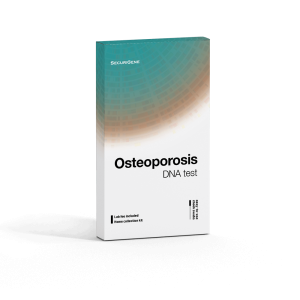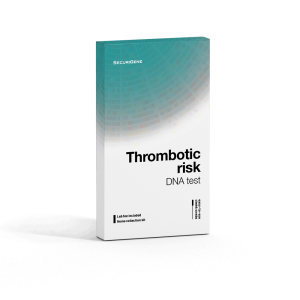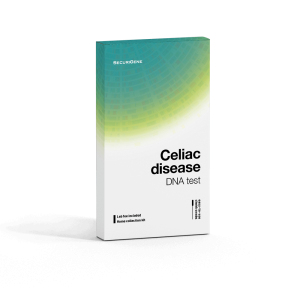APOE, or Apolipoprotein E, is a protein generated by the APOE gene, playing a vital role in the packaging and transportation of cholesterol and fats throughout the bloodstream. The APOE gene consists of three prevalent alleles: APOE e2, APOE e3, and APOE e4. APOE e4 is identified as the most potent genetic risk factor for Alzheimer’s disease, whereas APOE e3 is the most common allele. Interestingly, APOE e2 seems to demonstrate a neuroprotective effect against Alzheimer’s.
No hidden lab fees. Free return shipping included.
Get secure results through your private online portal.
All samples are tested twice for absolute accuracy.
Does late-onset Alzheimer’s disease run in your family? Find out if you are at risk with this DNA Test.

Alzheimer’s disease (AD) is a progressive neurological condition that systematically disrupts memory and crucial cognitive functions, predominantly presenting as the late-onset form in over 90% of cases, with symptoms emerging after the age of 65.
In affected brains, the presence of two abnormal structures, namely plaques and tangles, is notable. These structures are considered the primary contributors to the progression of cell death and tissue deterioration.
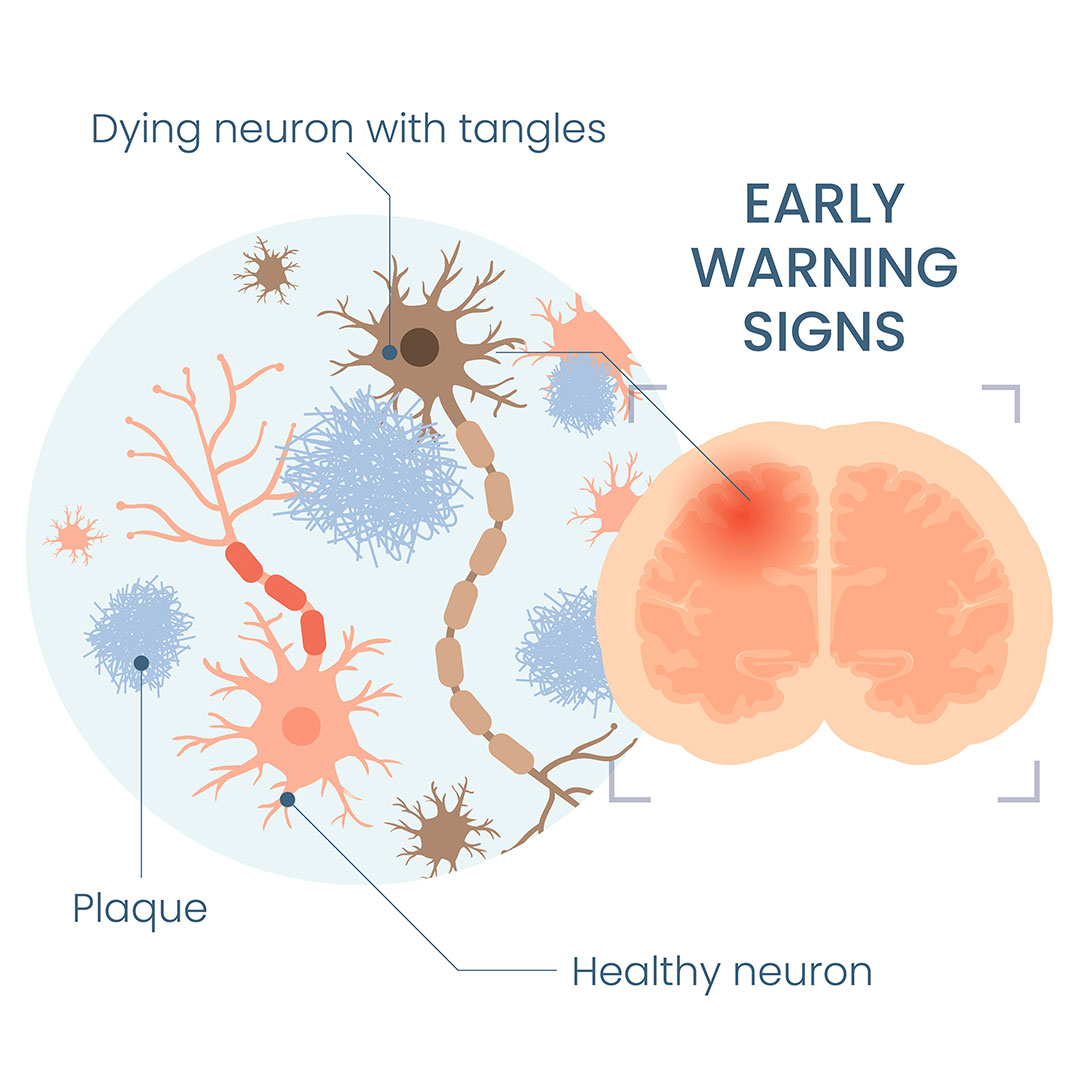
Plaques, composed of the beta-amyloid protein, impede communication between nerve cells. Tangles form when tau, a protein organizing parallel strings within nerve cells, unravels into a twisted structure. Disruption of proper tau tracks hinders the movement of essential nutrients and supplies within cells.
The accumulation of plaques and tangles is implicated in the observed cell death seen in Alzheimer’s disease (AD) brains. Consider undergoing this test to assess your risk and proactively take measures to maintain brain health.
About the Alzheimer’s Disease APOE DNA Test
The APOE gene is recognized as the most influential genetic risk factor linked to late-onset Alzheimer’s disease. The inherited alleles from your parents serve as indicators, determining whether there is an elevated lifetime risk of developing late-onset Alzheimer’s disease.
What are the potential genetic variants of APOE?
The APOE gene encompasses three genetic variants: APOE e2, APOE e3, and APOE e4.
- APOE e2, the least common allele, is observed in only 8.4% of the population, and individuals with this allele appear to have a slight protective effect against Alzheimer’s disease.
- APOE e3, the most prevalent allele, is present in 77.9% of the population and does not alter the risk of Alzheimer’s disease.
- APOE e4, the allele associated with increased risk, is found in 13.7% of the population. Individuals with one copy of this allele face a three-fold risk of developing late-onset Alzheimer’s, while those with two copies have a 10-15 fold increased risk.
It is crucial to note that, even with the APOE e4 genotype significantly elevating the risk, there are individuals with this allele who do not develop Alzheimer’s Disease, and conversely, there are those who develop Alzheimer’s without the APOE e4 genotype. Other genetic and non-genetic factors not examined in this test can contribute to an increased risk for Alzheimer’s disease.
Age Limit: None. This test is suitable for individuals of any age.
DNA Collection Method: Utilizing buccal swabs, the test kit includes easy-to-follow instructions for painless sample collection from the inside of the mouth.
Specimen Requirements: Four buccal swabs, gently rubbed against the cheek for 15 seconds.
Testing Methodology: Laboratory analysis involves sequence-based typing to identify the presence of three APOE alleles. The test exhibits analytical specificity and sensitivity of >99%. Note that other unlisted alleles are not detected.
Sample Handling: The Alzheimer’s disease DNA test kits have no expiration date and can be utilized at any time. After collecting the DNA sample, it should be returned to the laboratory for testing within three months. No refrigeration is necessary; store at room temperature.
Limitations: It’s essential to recognize that the presence of the APOE e4 allele does not guarantee the development of Alzheimer’s disease. While this allele increases the lifetime risk, many individuals with this allele never develop Alzheimer’s, and others without the allele do. Increased Alzheimer’s risk can also be influenced by various genetic and non-genetic factors not detected by this assay.
—
The Home DNA Test for Late-Onset Alzheimer’s Disease examines the APOE gene, recognized as the most influential genetic factor affecting the risk of developing late-onset Alzheimer’s Disease (AD). This gene encodes apolipoprotein E, a vital component in the central nervous system involved in fat transport, neuronal growth, nerve regeneration, immunoregulation, and injury repair.
Risk Factors
Individuals with one copy of the e4 allele face a threefold heightened risk of developing Alzheimer’s disease, while e4 homozygotes (possessing two copies of e4) may experience up to a 15-fold increased risk. Other factors contributing to the risk encompass health conditions such as diabetes and cardiovascular disease, lifestyle factors like smoking and excessive alcohol consumption, cognitive and physical inactivity, and incidents of head trauma.
Genes Analyzed
The APOE gene has three prevalent variants, or alleles, labeled as e2, e3, and e4. Each individual inherits two copies of the APOE gene. The APOE genotype serves as an indicator of the risk of developing late-onset Alzheimer’s Disease (AD).
Here are the possible allelic combinations and their associated risk factors:
- e2/e2 – reduced risk
- e2/e3 – reduced risk
- e2/e4 – 3X increased risk
- e3/e3 – does not affect your risk
- e3/e4 – 3X increased risk
- e4/e4 – 10X to 15X increased risk
This DNA test will identify which pair of alleles of the APOE gene you have inherited and your related risk factor. Understanding your genetic risk for AD can encourage early monitoring and allow drug treatment to begin as soon as possible to delay the progression of the disease.
Warning Signs
- Memory loss that disturbs daily life
- Challenges in planning or solving problems
- Difficulty performing familiar tasks
- Confusion with time or place
- Trouble understanding visual images or spatial relationships
- New problems with words in speaking or writing
- Misplacing things and losing the ability to retrace steps
- Decreased or poor judgment
- Withdrawals from work or social activities
- Changes in mood or personality
Limitations: It’s crucial to acknowledge that the presence of the APOE e4 allele does not guarantee the development of Alzheimer’s disease. While this allele increases the lifetime risk, many individuals with it never develop Alzheimer’s, and others without the allele do. Increased risk can also be influenced by various genetic and environmental factors not identified by this assay.
Does late-onset Alzheimer’s disease run in your family? Find out if you are at risk with this DNA Test.

Alzheimer’s disease (AD) is a progressive neurological condition that systematically disrupts memory and crucial cognitive functions, predominantly presenting as the late-onset form in over 90% of cases, with symptoms emerging after the age of 65.
In affected brains, the presence of two abnormal structures, namely plaques and tangles, is notable. These structures are considered the primary contributors to the progression of cell death and tissue deterioration.

Plaques, composed of the beta-amyloid protein, impede communication between nerve cells. Tangles form when tau, a protein organizing parallel strings within nerve cells, unravels into a twisted structure. Disruption of proper tau tracks hinders the movement of essential nutrients and supplies within cells.
The accumulation of plaques and tangles is implicated in the observed cell death seen in Alzheimer’s disease (AD) brains. Consider undergoing this test to assess your risk and proactively take measures to maintain brain health.
About the Alzheimer’s Disease APOE DNA Test
The APOE gene is recognized as the most influential genetic risk factor linked to late-onset Alzheimer’s disease. The inherited alleles from your parents serve as indicators, determining whether there is an elevated lifetime risk of developing late-onset Alzheimer’s disease.
What are the potential genetic variants of APOE?
The APOE gene encompasses three genetic variants: APOE e2, APOE e3, and APOE e4.
- APOE e2, the least common allele, is observed in only 8.4% of the population, and individuals with this allele appear to have a slight protective effect against Alzheimer’s disease.
- APOE e3, the most prevalent allele, is present in 77.9% of the population and does not alter the risk of Alzheimer’s disease.
- APOE e4, the allele associated with increased risk, is found in 13.7% of the population. Individuals with one copy of this allele face a three-fold risk of developing late-onset Alzheimer’s, while those with two copies have a 10-15 fold increased risk.
It is crucial to note that, even with the APOE e4 genotype significantly elevating the risk, there are individuals with this allele who do not develop Alzheimer’s Disease, and conversely, there are those who develop Alzheimer’s without the APOE e4 genotype. Other genetic and non-genetic factors not examined in this test can contribute to an increased risk for Alzheimer’s disease.
Age Limit: None. This test is suitable for individuals of any age.
DNA Collection Method: Utilizing buccal swabs, the test kit includes easy-to-follow instructions for painless sample collection from the inside of the mouth.
Specimen Requirements: Four buccal swabs, gently rubbed against the cheek for 15 seconds.
Testing Methodology: Laboratory analysis involves sequence-based typing to identify the presence of three APOE alleles. The test exhibits analytical specificity and sensitivity of >99%. Note that other unlisted alleles are not detected.
Sample Handling: The Alzheimer’s disease DNA test kits have no expiration date and can be utilized at any time. After collecting the DNA sample, it should be returned to the laboratory for testing within three months. No refrigeration is necessary; store at room temperature.
Limitations: It’s essential to recognize that the presence of the APOE e4 allele does not guarantee the development of Alzheimer’s disease. While this allele increases the lifetime risk, many individuals with this allele never develop Alzheimer’s, and others without the allele do. Increased Alzheimer’s risk can also be influenced by various genetic and non-genetic factors not detected by this assay.
—
The Home DNA Test for Late-Onset Alzheimer’s Disease examines the APOE gene, recognized as the most influential genetic factor affecting the risk of developing late-onset Alzheimer’s Disease (AD). This gene encodes apolipoprotein E, a vital component in the central nervous system involved in fat transport, neuronal growth, nerve regeneration, immunoregulation, and injury repair.
Risk Factors
Individuals with one copy of the e4 allele face a threefold heightened risk of developing Alzheimer’s disease, while e4 homozygotes (possessing two copies of e4) may experience up to a 15-fold increased risk. Other factors contributing to the risk encompass health conditions such as diabetes and cardiovascular disease, lifestyle factors like smoking and excessive alcohol consumption, cognitive and physical inactivity, and incidents of head trauma.
Genes Analyzed
The APOE gene has three prevalent variants, or alleles, labeled as e2, e3, and e4. Each individual inherits two copies of the APOE gene. The APOE genotype serves as an indicator of the risk of developing late-onset Alzheimer’s Disease (AD).
Here are the possible allelic combinations and their associated risk factors:
- e2/e2 – reduced risk
- e2/e3 – reduced risk
- e2/e4 – 3X increased risk
- e3/e3 – does not affect your risk
- e3/e4 – 3X increased risk
- e4/e4 – 10X to 15X increased risk
This DNA test will identify which pair of alleles of the APOE gene you have inherited and your related risk factor. Understanding your genetic risk for AD can encourage early monitoring and allow drug treatment to begin as soon as possible to delay the progression of the disease.
Warning Signs
- Memory loss that disturbs daily life
- Challenges in planning or solving problems
- Difficulty performing familiar tasks
- Confusion with time or place
- Trouble understanding visual images or spatial relationships
- New problems with words in speaking or writing
- Misplacing things and losing the ability to retrace steps
- Decreased or poor judgment
- Withdrawals from work or social activities
- Changes in mood or personality
Limitations: It’s crucial to acknowledge that the presence of the APOE e4 allele does not guarantee the development of Alzheimer’s disease. While this allele increases the lifetime risk, many individuals with it never develop Alzheimer’s, and others without the allele do. Increased risk can also be influenced by various genetic and environmental factors not identified by this assay.
Be Proactive With Your Health
Understanding your genetic risk provides you with the opportunity for early intervention and prevention through certain lifestyle changes.
Easy sample collection
Each kit contains painless, easy-to-use mouth swabs.
Quality assured
All testing is performed in our ISO 17025, AABB and CLIA certified laboratory.
Live status updates
Track the status of your order and view your results as soon as they are ready.
Private & confidential
Your data belongs to you. We do not share your data with any third party without your permission.
How it works

Collect & Send
Swab your mouth, then mail your samples to our lab. Free shipping included.
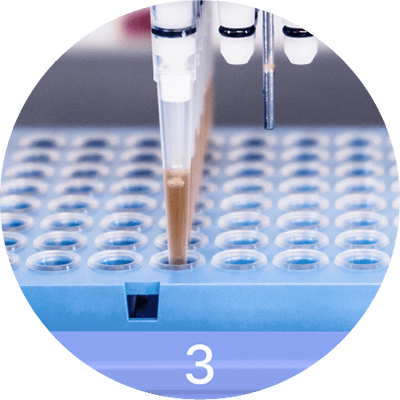
Get Results
Receive confidential results through your secure online portal.
FAQ
Answers to commonly asked questions about this test.
Alzheimer’s disease is a progressive and degenerative brain disorder affecting memory, cognition, and behavior.Characterized by abnormal protein deposits in the brain, Alzheimer’s results in the destruction of brain cells and the formation of plaques and tangles. This process leads to a gradual loss of memory and cognitive functions, eventually necessitating full-time care.
Although the exact cause remains unclear, Alzheimer’s is believed to stem from a combination of genetic, environmental, and lifestyle factors. Risk factors include age, family history, genetics, and certain lifestyle factors such as an diet, insufficient physical activity, and heightened stress levels.
The APOE e4 allele is notably a significant genetic risk factor for Alzheimer’s. Identify its presence easily with the Alzheimer’s Disease DNA Test.
Alzheimer’s disease is a prevalent form of dementia and a primary contributor to age-related cognitive decline. The Alzheimer’s Association reports approximately 6.2 million individuals in the United States are affected by Alzheimer’s, with this number expected to nearly triple to 14 million by 2050.
Globally, the World Health Organization estimates around 50 million people are living with dementia, with Alzheimer’s disease emerging as the most common cause. The likelihood of Alzheimer’s increases with age, impacting about 10% of individuals over 65 years old and potentially affecting as many as 50% of those over 85 years old.
It’s essential to note that the presence of APOE e4 does not guarantee the development of late-onset Alzheimer’s. It cannot serve as a diagnostic tool for symptomatic individuals. Instead, identifying the presence of the allele(s) provides insights into the likelihood of developing the disease.
The APOE e4 allele is prevalent among the majority of Alzheimer’s disease patients. Individuals testing positive for one copy of APOE e4 face a threefold increased risk of developing late-onset Alzheimer’s compared to those testing negative. Moreover, individuals with two copies of APOE e4 have a heightened risk, ranging from 10 to 15 times, compared to those without the allele.
Testing begins promptly upon the arrival of your samples at the laboratory and is typically completed within 2 to 4 weeks. In specific cases requiring additional testing, the turnaround time may be extended by a few extra days. You can conveniently check your test status at any time through your secure account login. Once testing is finalized, your comprehensive test report is promptly released to your secure online portal.
